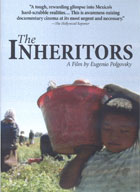
The Inheritors 2008
Distributed by Icarus Films, 32 Court St., 21st Floor, Brooklyn, NY 11201; 800-876-1710
Produced by Eugenio Polgovsky
Directed by Eugenio Polgovsky
DVD, color, 90 min.
Sr. High - Adult
Sociology, Latin American Studies, Anthropology
Date Entered: 01/12/2010
Reviewed by Karen Coronado, George Fox University, Newberg, ORSet in agricultural fields and other rural locations in Mexico, this documentary follows the day-to-day lives of several hard-working Mexican families. Offering a panoply of their ongoing routines and responsibilities, the film shows children, men, and women laboring at various chores and wage earning jobs such as plowing, harvesting, brickmaking, weaving, cooking, herding and feeding animals, gathering firewood, cutting cane, chopping wood, and carrying water. However, the focus is on the children and the perpetual cycle of labor and poverty that they have inherited. The film's director/producer, Eugenio Polgovsky compels the viewer to not only look at their present condition but to also envision their future. He does this by interspersing occasional scenes and close ups of the elderly who have lived this same life in these same places for so long.
Poor but dignified, these people are strong and resilient living by an amazing work ethic which should be a source of great pride. Without much in the way of modern equipment or conveniences everyone improvises and works together with the resources that they have. While the conditions that these children and their families live in is much less than any of us would want for them, they appear healthy, well nourished and energetic, and the children find time to play, laugh, sing and dance. Although some situations will be disapproving or grievous to the viewer, it is obvious that the parents are doing the best they can under the circumstances to care and provide for their children.
This documentary does not depict any violence, abuse, or foul language. There is no narration and the sparse dialogue is in Spanish with English subtitles. The camera work and editing are done with skill and artistry but it is a long, slow paced and repetitive documentary. At the same time the length of the film and the iterative presentation of the daily chores and field work do add to the impact of the documentary. Lengthy segments of people riding in trucks on their way to a long day in the fields or watching young boys methodically making bricks from morning till evening serves to amplify their march through a mundane and harsh daily life. This film is well done and offers a realistic portal into the lives of poor, hardworking families in the Mexican countryside.
Awards
- Grand Prize, 2008 Festival of New Latin American Cinema
- Best Documentary, 2009 Mexican Academy of Film Arts and Sciences
- Feisal Prize, 2009 Guadalajara Film Festival
- Best Documentary, 2009 Festival de la Memoria
- Best Documentary, Santiago International Documentary Festival